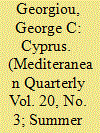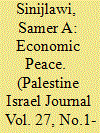| Srl | Item |
| 1 |
ID:
090979


|
|
|
|
|
| Publication |
2009.
|
| Summary/Abstract |
This essay analyzes the economic consequences of the proposed reunification of Cyprus and concludes that, based on the framework presently being negotiated, the much-publicized economic peace dividend will not materialize for the majority of Cypriots. The economic costs and benefits of such an agreement will inevitably be unequally divided, with the Greek-Cypriot majority bearing the brunt of the economic burden with no political or security offset.
|
|
|
|
|
|
|
|
|
|
|
|
|
|
|
|
| 2 |
ID:
184487


|
|
|
|
|
| Summary/Abstract |
The slogan “shrinking the conflict” aims at strengthening the occupation by prioritizing Israel’s interests and its expansionist policy over the attainment of Palestinian rights.
|
|
|
|
|
|
|
|
|
|
|
|
|
|
|
|
| 3 |
ID:
111219


|
|
|
|
|
| Publication |
2012.
|
| Summary/Abstract |
The British experience of insurgency and counterinsurgency (COIN) probably is the most prolific in all modern history. What General Sir Rupert Smith has called 'wars among the people' have been endemic for several centuries and it is wrong to describe them as a 'new' form of warfare for the 21st century. The accepted wisdom is that the British developed a doctrine and techniques based upon 'hearts and minds' and 'minimum force' so as to bring about a positive conclusion to insurgency - in short, a better political and economic peace. The British record is, overall, one to be proud of, and the principle of 'courageous restraint' rarely emulated in other COINs such as at the hands of the French in Algiers, the Americans in Vietnam or the Russians in Afghanistan. Yet, there were occasions when these high standards of discipline and leadership were found wanting and in all 14 or so British campaigns, from time to time either politicians, soldiers or police disregarded the common law basis for action, with terrible human consequences. This article attempts to analyse these circumstances from a historical vantage, so as to infer the reason why such incidents took place: a matter of policy, flawed leadership or simply indiscipline? The political consequences of atrocity usually were out of all proportion to the actual incident, whether after Amritsar in 1919 (the loss of India) or Bloody Sunday in 1972 (a sustained terrorist campaign over 30 and more years). The article concludes that ethical leadership is at the very heart of COIN, yet this too often is overlooked.
|
|
|
|
|
|
|
|
|
|
|
|
|
|
|
|